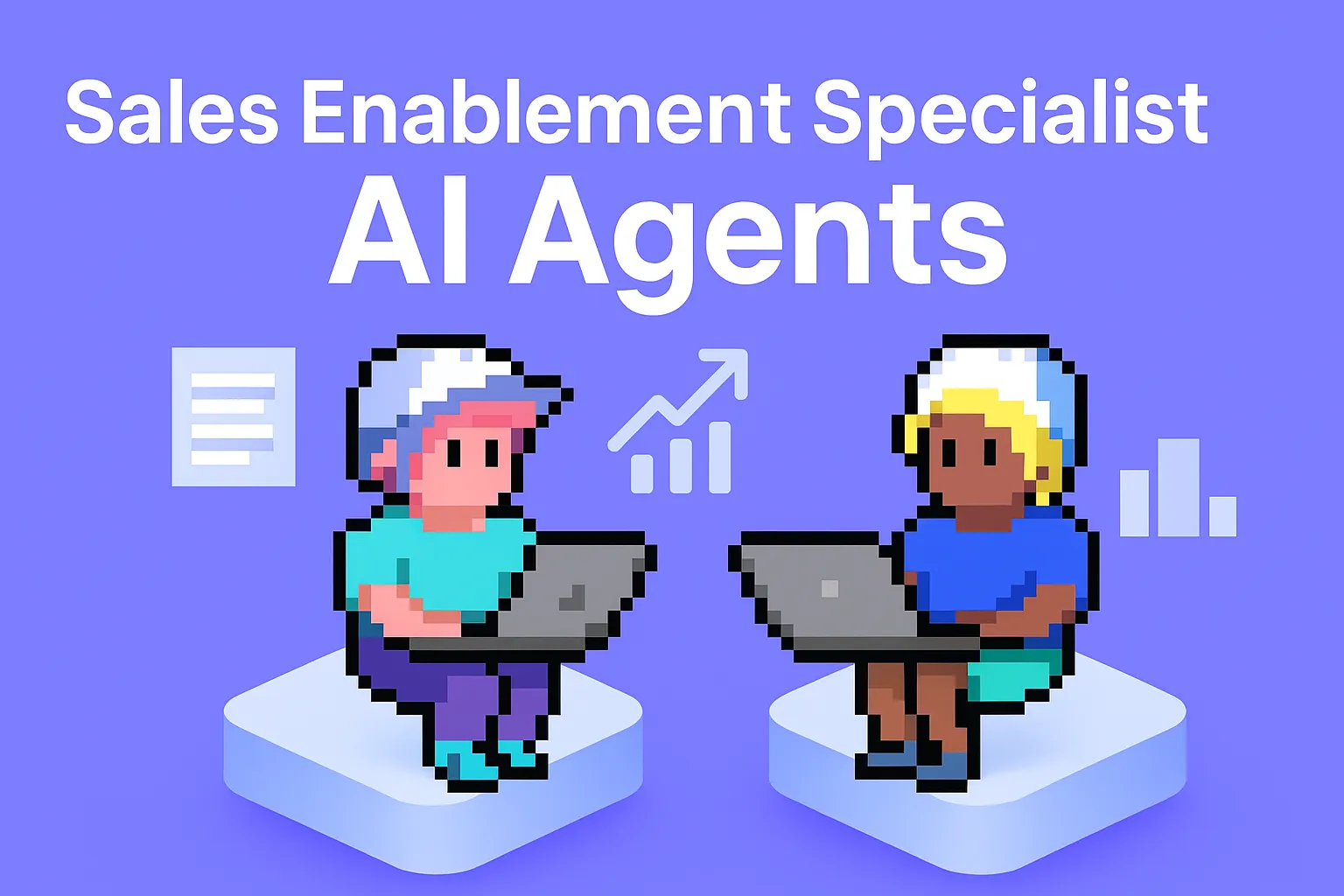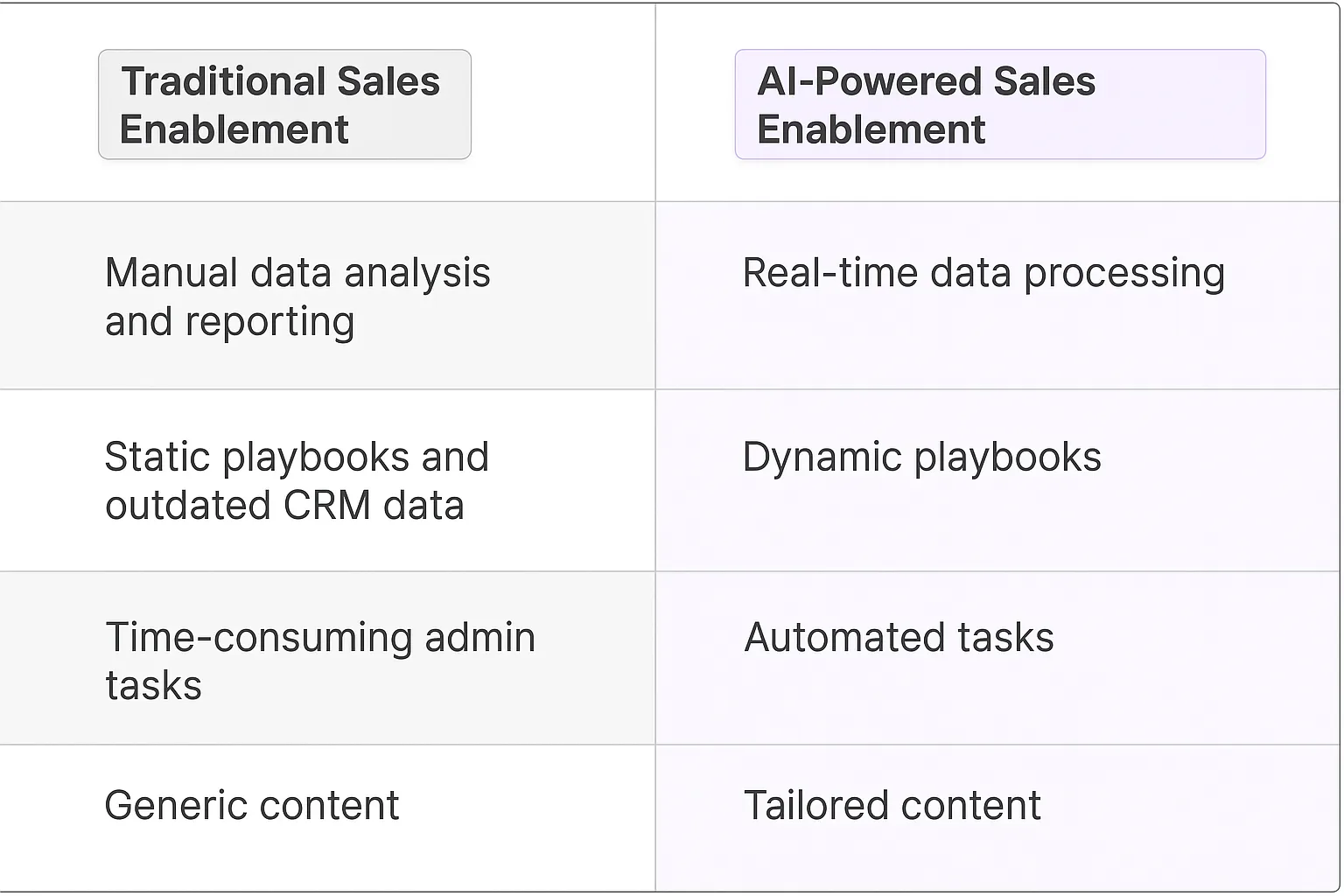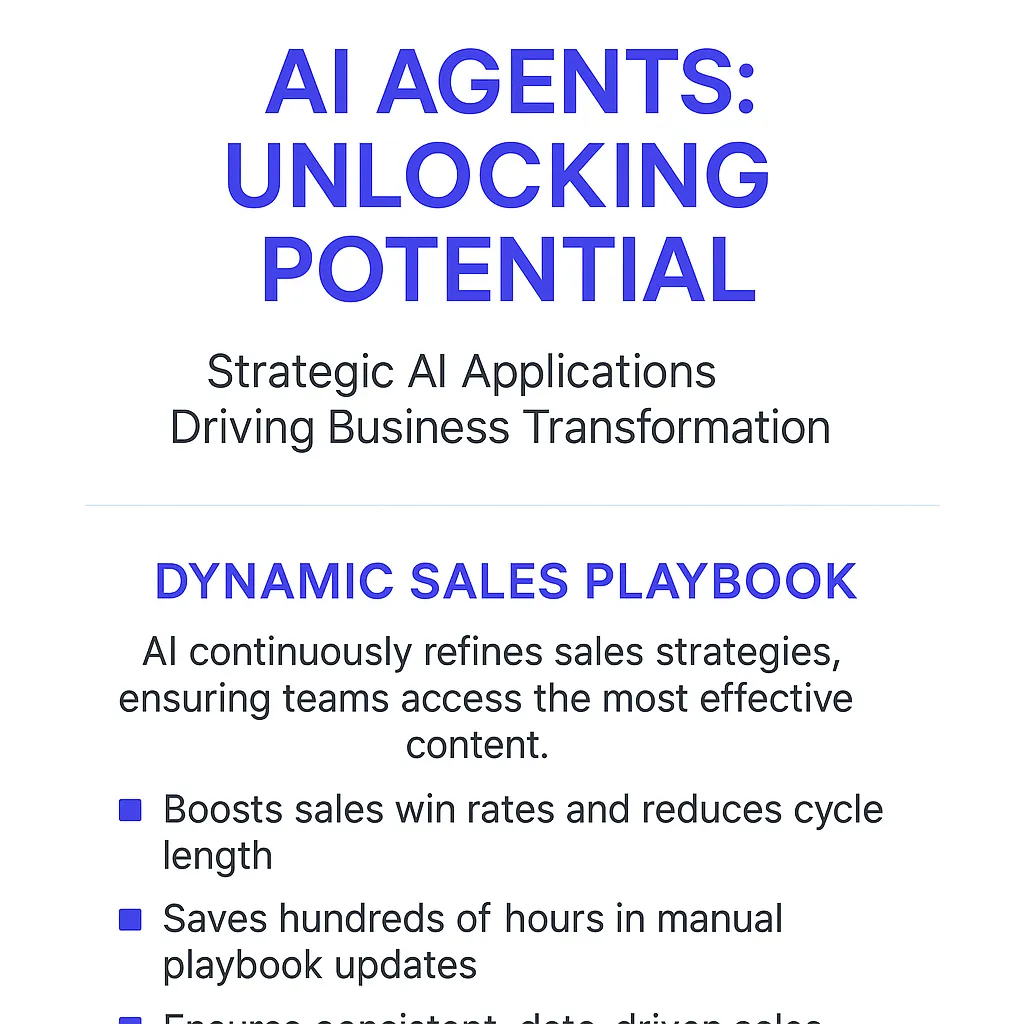Sales Enablement Specialist AI is a cutting-edge technology that acts as a digital teammate for sales teams. It's designed to enhance the capabilities of human sales professionals by processing vast amounts of data, providing real-time insights, and automating time-consuming tasks. These AI agents are not just tools, but intelligent systems that learn and adapt to your specific sales processes and industry nuances.
The standout features of Sales Enablement Specialist AI include real-time data analysis, predictive analytics for lead scoring, personalized content recommendations, automated task management, and continuous learning capabilities. These AI agents can integrate with existing CRM systems, analyze customer interactions, and provide actionable insights to sales reps at every stage of the sales funnel. They're essentially a Swiss Army knife for modern sales teams, capable of everything from drafting personalized emails to identifying emerging market trends.

Before AI agents entered the scene, sales enablement was a manual, time-consuming process. Sales teams relied on static playbooks, outdated CRM data, and endless email threads. They'd spend hours digging through spreadsheets, trying to piece together customer insights. It was like trying to solve a puzzle with half the pieces missing.
The old way meant constant context-switching between tools, leading to cognitive overload and missed opportunities. Sales reps were spending more time on admin tasks than actually selling. It was a classic case of working harder, not smarter.
AI agents are game-changers for sales enablement. They're like having a team of digital teammates who never sleep, never take vacations, and are always learning. These agents can process vast amounts of data in real-time, providing sales reps with actionable insights at their fingertips.
One of the key benefits is personalization at scale. AI agents can analyze customer interactions, preferences, and behavior patterns to tailor pitches and content for each prospect. This level of customization was previously impossible without an army of analysts.
AI agents also excel at predictive analytics. They can identify which leads are most likely to convert, allowing sales teams to focus their efforts where they'll have the biggest impact. It's like having a crystal ball that actually works.
Another major advantage is the ability to automate routine tasks. AI agents can handle scheduling, follow-ups, and even draft personalized emails. This frees up sales reps to focus on high-value activities like building relationships and closing deals.
Perhaps most importantly, AI agents provide continuous learning and improvement. They analyze successful sales interactions, identify winning strategies, and disseminate best practices across the team. It's like having a sales coaching that's always on duty, constantly refining the playbook.
The result? Faster sales cycles, higher conversion rates, and more revenue per rep. It's not just an incremental improvement - it's a fundamental shift in how sales teams operate and compete. With advanced sales analytics, teams can make data-driven decisions that drive real results.

Sales enablement is a critical function that often gets overlooked in the grand scheme of things. But let's face it, without proper enablement, your sales team is like a Ferrari without fuel - all show, no go. This is where AI agents come in, acting as digital teammates to supercharge your sales enablement efforts.
One of the most impactful processes an AI agent can assist with is the creation and maintenance of a dynamic sales playbook. Think of it as a living, breathing document that evolves with your business. The AI can continuously analyze successful sales interactions, identify patterns, and update the playbook in real-time. This means your sales team always has access to the most current, effective strategies and tactics.
Another process ripe for AI intervention is sales training and onboarding. An AI agent can personalize the learning journey for each new hire, adapting the curriculum based on their background, strengths, and areas for improvement. It's like having a personal sales coach for every team member, available 24/7.
When it comes to specific tasks, AI agents can be game-changers for sales enablement specialists. Take content curation, for instance. An AI can sift through mountains of internal and external data to surface the most relevant and impactful content for each stage of the sales funnel. It's like having a content sommelier, always ready with the perfect piece to pair with your prospect's needs.
Competitive intelligence is another area where AI can shine. These digital teammates can continuously monitor competitor activities, pricing changes, and market trends, providing real-time updates to your sales team. It's like having a spy network, minus the fancy gadgets and martinis.
Let's not forget about the often tedious task of sales analytics. AI agents can crunch numbers faster than you can say "quota attainment," providing actionable insights on everything from individual performance metrics to overall pipeline health. It's like having a data scientist on steroids, without the lab coat and safety goggles.
Lastly, AI can revolutionize how we approach sales coaching. By analyzing call recordings and email exchanges, these digital teammates can provide personalized feedback and improvement suggestions to each sales rep. It's like having a mini-me version of your top performer, ready to guide and mentor the entire team.
The potential of AI in sales enablement is massive. It's not about replacing human expertise, but augmenting it. By offloading repetitive tasks and providing data-driven insights, AI frees up sales enablement specialists to focus on what they do best - strategizing and empowering the sales team to crush their targets. The future of sales enablement isn't just bright; it's AI-powered.

The versatility of AI agents in Sales Enablement Specialist roles is reshaping how businesses approach their sales strategies. These digital teammates are proving invaluable across various industries, each with its unique challenges and opportunities. Let's dive into some specific use cases that illustrate how AI is transforming sales enablement workflows and processes.
From tech startups to Fortune 500 companies, sales teams are leveraging AI to gain a competitive edge. These AI agents aren't just tools; they're becoming integral members of sales enablement teams, offering insights and support that were previously unimaginable. By analyzing vast amounts of data, predicting trends, and providing real-time assistance, these AI specialists are helping sales teams close deals faster and more efficiently than ever before.
But it's not just about speed and efficiency. These AI agents are also enhancing the quality of sales interactions, ensuring that every touchpoint with a potential customer is meaningful and tailored to their specific needs. This level of personalization at scale is a game-changer, especially in industries where customer relationships are paramount.
As we explore these use cases, we'll see how AI is not replacing human sales enablement specialists, but rather augmenting their capabilities, allowing them to focus on high-value tasks that require emotional intelligence and complex decision-making. The result is a symbiotic relationship between human and AI that's pushing the boundaries of what's possible in sales enablement.
The real estate industry is ripe for disruption, and Sales Enablement AI agents are poised to be the game-changers. These digital teammates are not just another tool in the toolbox; they're the Swiss Army knife that real estate professionals didn't know they needed.
Consider a high-performing real estate agency. They're juggling multiple listings, client preferences, market trends, and a sea of paperwork. Enter the Sales Enablement AI agent. This digital powerhouse can analyze vast amounts of property data, cross-reference it with client preferences, and serve up tailored recommendations faster than you can say "open house."
But here's where it gets interesting. These AI agents don't just crunch numbers; they learn and adapt. They pick up on subtle cues in client interactions, understand the nuances of local markets, and even predict upcoming trends. Imagine an AI that can tell you which neighborhoods are about to boom before the first hipster coffee shop even opens its doors.
For real estate agents, this means spending less time on grunt work and more time building relationships. The AI handles the tedious tasks of scheduling viewings, following up on leads, and even drafting initial property descriptions. This frees up agents to focus on what they do best: closing deals and making clients happy.
But the real magic happens in the backend. These AI agents are constantly learning from every interaction, every sale, every market fluctuation. They're building a knowledge base that's not just big, but smart. Over time, they become an invaluable resource, offering insights that even veteran agents might miss.
The result? A real estate agency that operates with the efficiency of a tech startup and the personal touch of a family business. It's not about replacing human agents; it's about amplifying their capabilities to superhuman levels.
This isn't some far-off future. The technology is here, and early adopters in the real estate industry are already seeing the benefits. As these AI agents become more sophisticated, we're looking at a future where buying or selling a home is as smooth and personalized as ordering your favorite latte.
The real estate industry is just the tip of the iceberg. Sales Enablement AI agents have the potential to transform any industry where personalized service and data-driven decisions intersect. And in today's market, that's pretty much everywhere.
E-commerce is a battlefield, and Sales Enablement AI agents are the secret weapons that could tip the scales. These digital teammates are reshaping how online retailers engage with customers, optimize inventory, and drive sales in ways that would make Jeff Bezos sit up and take notice.
Let's zoom in on a mid-sized e-commerce platform selling everything from artisanal hot sauces to vintage vinyl records. Their challenge? Standing out in a crowded market where customer attention is more fleeting than a Snapchat story.
Enter the Sales Enablement AI agent. This isn't your run-of-the-mill chatbot. We're talking about a sophisticated digital entity that's part data analyst, part personal shopper, and part psychic. It's constantly sifting through mountains of data - purchase history, browsing patterns, social media trends - to create a 360-degree view of each customer.
But here's where it gets interesting. These AI agents don't just react; they anticipate. They're not waiting for customers to search for products. Instead, they're proactively curating personalized recommendations that feel almost eerily prescient. It's like having a friend who always knows exactly what you want before you do.
For the e-commerce platform, this translates into a massive uplift in conversion rates. The AI is essentially doing the heavy lifting of a thousand sales associates, each one intimately familiar with every customer's preferences and quirks.
But it doesn't stop at customer interactions. These AI agents are also working behind the scenes, optimizing inventory management with predictive analytics that would make a Fortune 500 supply chain manager weep with joy. They're identifying trends before they hit mainstream, allowing the platform to stock up on the next big thing before competitors even catch wind of it.
The result is an e-commerce experience that feels less like shopping and more like a curated journey. It's personal, it's efficient, and it's driving customer loyalty in a way that traditional loyalty programs could only dream of.
This isn't just theory. We're seeing early adopters in the e-commerce space leveraging these AI agents to create a competitive edge that's hard to match. They're turning data into dollars, and in the process, redefining what it means to shop online.
As these AI agents continue to evolve, we're looking at a future where e-commerce platforms don't just sell products; they create experiences. It's a shift that has the potential to reshape the entire retail landscape, blurring the lines between online and offline shopping in ways we're only beginning to imagine.
The e-commerce industry is just one example of how Sales Enablement AI is changing the game. Any sector where customer relationships and data intersect is ripe for this kind of transformation. And in the digital age, that's pretty much every industry under the sun.
Implementing a Sales Enablement Specialist AI Agent isn't just about flipping a switch. It's a complex dance of data, algorithms, and integration. First off, you're dealing with the beast that is sales data - it's messy, it's scattered, and it's often incomplete. Your AI needs to be smart enough to make sense of this chaos, connecting dots that humans might miss.
Then there's the integration hurdle. Your shiny new AI needs to play nice with your existing tech stack. CRM systems, marketing automation tools, analytics platforms - they all need to shake hands and share data seamlessly. It's like trying to get a group of cats to march in formation.
Let's not forget about the AI's learning curve. It needs to understand the nuances of your sales process, the quirks of your industry, and the subtle differences between a hot lead and a lukewarm one. This isn't something you can rush. It takes time, patience, and a lot of fine-tuning.
On the operational side, you're essentially introducing a new team member - one that never sleeps, never takes a coffee break, but also never improvises. Your human sales team needs to learn how to work alongside this digital teammate. It's not about replacement; it's about augmentation. But try telling that to a sales rep who's been crushing quotas for 20 years.
There's also the challenge of setting realistic expectations. Your C-suite might be salivating at the prospect of AI-driven sales growth, but they need to understand that this isn't a magic wand. It's a powerful tool, sure, but it's not going to turn your sales team into overnight rock stars.
Data privacy and security is another can of worms. Your AI is going to be handling sensitive customer information, sales forecasts, and potentially proprietary data. You need to make sure your system is Fort Knox-level secure, or you're just asking for trouble.
Lastly, there's the ongoing maintenance and optimization. An AI Sales Enablement Specialist isn't a set-it-and-forget-it solution. It needs constant feeding of new data, tweaking of algorithms, and adaptation to changing market conditions. It's like having a high-performance sports car - amazing when it's running smoothly, but it needs a lot of care and attention to keep it that way.
Sales Enablement Specialist AI Agents are not just a trend; they're the future of sales. By augmenting human capabilities with AI-driven insights and automation, these digital teammates are enabling sales teams to operate at unprecedented levels of efficiency and effectiveness. While challenges exist in implementation and integration, the potential benefits far outweigh the hurdles. As AI technology continues to evolve, we can expect these agents to become even more sophisticated, further blurring the lines between human and artificial intelligence in the sales process. The companies that successfully harness this technology will likely find themselves with a significant competitive advantage in the years to come. The question isn't whether to adopt Sales Enablement AI, but how quickly you can integrate it into your sales strategy.